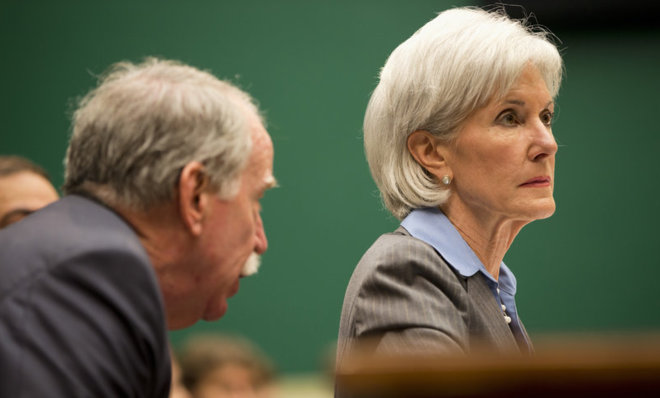ObamaCare's dismal October signup numbers: Time to panic?
Only about 100,000 people — about a fifth of the White House's projections — reportedly enrolled in health insurance plans in the first month


A free daily email with the biggest news stories of the day – and the best features from TheWeek.com
You are now subscribed
Your newsletter sign-up was successful
In September, the White House estimated that 500,000 people would sign up for health insurance plans via HealthCare.gov and the 14 state-run online insurance marketplaces in ObamaCare's inaugural month. The Health and Human Services Department will release its figures for October sometime this week, but two new reports suggest the actual number of people who signed up so far will be a pretty dismal 100,000.
The Wall Street Journal and Washington Post, each citing two people familiar with the numbers, report that between 40,000 and 50,000 people enrolled for plans in the 36 states relying on the infamously glitchy federal website. Another 49,100 people signed up in 11 of the 14 states running their own sites plus Washington, D.C., according to an estimate by the research and consulting firm Avalere Health. (Avalere didn't include California, Oregon, or Massachusetts.)
Those numbers look pretty bleak, but they're "actually not a disaster," says Sarah Kliff at The Washington Post. Avalere's 12 state exchanges only signed up 3 percent of their target 1.4 million customers for 2014, but "most health policy experts predict that enrollment will move faster in November and December, as we get closer to the Dec. 15 enrollment deadline for January coverage." In Massachusetts, by comparison, RomneyCare signed up only 0.3 percent of its first-year customers in its inaugural month — "as the White House points out pretty much any chance it gets."
The Week
Escape your echo chamber. Get the facts behind the news, plus analysis from multiple perspectives.

Sign up for The Week's Free Newsletters
From our morning news briefing to a weekly Good News Newsletter, get the best of The Week delivered directly to your inbox.
From our morning news briefing to a weekly Good News Newsletter, get the best of The Week delivered directly to your inbox.
The reported enrollment numbers through the federal HealthCare.gov site look worse, but "given the problems we have witnessed and experienced, that [40,000 to 50,000] number is actually higher than I expected," Cliff Gold at nonprofit insurer CoOportunity Health tells The Wall Street Journal. Gold adds that his group's signup numbers, in Nebraska and Iowa, are steadily ticking upward as the website works out its kinks.
Avik Roy at Forbes is not as optimistic: 500,000 sign-ups in October was "a lowball estimate" to begin with, he says. Plus, "the enrollment data from the federal government may actually exaggerate the number of people who have signed up," he continues, citing a Washington Post article that said HHS will report the number of people who have paid for their plans as well as those who just put them in their online shopping cart to buy later (or not). Roy concludes:
Based on what we've seen to date from the administration, it appears likely that the website will take four to six months to function properly. The Obama administration should take the advice of the Democratic chairman of the Senate Finance Committee, Max Baucus (D-Mont.), and shut the thing down until they can fix it. [Forbes]
Alan S. Blinder at The Wall Street Journal, however, says everybody needs to calm down and get a little perspective. Yes, the malfunctioning website has damaged the rollout — "becoming a national laughingstock is worse than getting off to a bad start," he says — and if enough young, healthy people don't sign up, the whole exchange system is in serious trouble.
But a badly designed website doesn't signify a badly designed policy. The goals, principles, and major design features of the [Affordable Care Act] are barely affected by the government's health-exchange website catastrophe. If you liked the basic ideas before, you still should. If you didn't, you still shouldn't. [Wall Street Journal]
A free daily email with the biggest news stories of the day – and the best features from TheWeek.com
Peter has worked as a news and culture writer and editor at The Week since the site's launch in 2008. He covers politics, world affairs, religion and cultural currents. His journalism career began as a copy editor at a financial newswire and has included editorial positions at The New York Times Magazine, Facts on File, and Oregon State University.
-
 Political cartoons for February 15
Political cartoons for February 15Cartoons Sunday's political cartoons include political ventriloquism, Europe in the middle, and more
-
 The broken water companies failing England and Wales
The broken water companies failing England and WalesExplainer With rising bills, deteriorating river health and a lack of investment, regulators face an uphill battle to stabilise the industry
-
 A thrilling foodie city in northern Japan
A thrilling foodie city in northern JapanThe Week Recommends The food scene here is ‘unspoilt’ and ‘fun’
